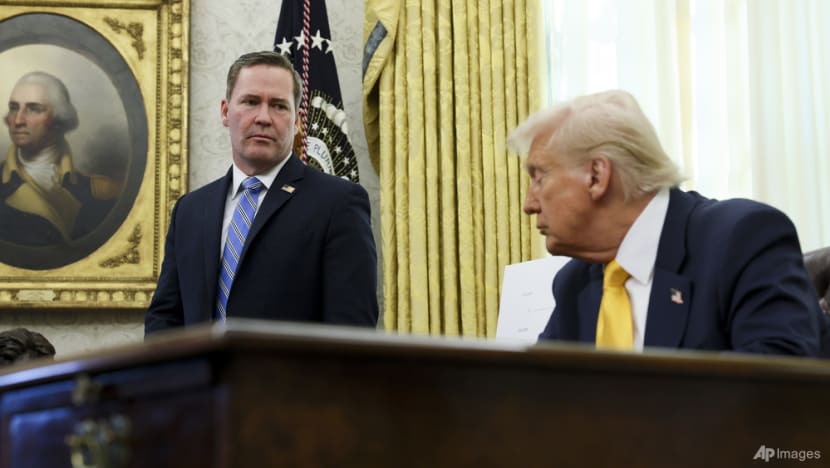Commentary: Trump administration cannot fully contain fallout of Signalgate
After Signalgate, US allies and partners might hesitate to share high-level intelligence without assurances that protocols will be followed, says RSIS’ Adrian Ang.

White House National Security Advisor Mike Waltz listens as President Donald Trump speaks in the Oval Office of the White House in Washington, Mar 7, 2025. (Pool via AP)

This audio is generated by an AI tool.
SINGAPORE: Questions remain in the wake of “Signalgate”, in which The Atlantic editor-in-chief Jeffrey Goldberg was mistakenly added to a group chat with senior US officials discussing then-impending strikes against Houthi militants in Yemen.
The Trump administration vehemently denied that any classified information was shared in the group chat. It also attempted to discredit The Atlantic and Mr Goldberg.
In response, The Atlantic has since published the messages, including those sent by US Secretary of Defense Pete Hegseth detailing specific targets, weapons to be deployed, timing and attack sequencing approximately two hours before the strikes against the Houthis were to commence.
US National Security Advisor Mike Waltz had also sent an early assessment of the effectiveness of the attack to the group chat.
Signalgate has revealed the Trump administration’s approach to communicating and archiving sensitive information. The fallout will be deeply felt by US allies and partners.
WAS CLASSIFIED INFORMATION SHARED?
Given the potential damage of the chat breach regarding Houthi strikes – endangering the safety of US forces and jeopardising the success of the operation – there is a reasonable expectation that the information was, or should have been classified.
An executive order issued in 2009 by then-US president Barack Obama states that information should be classified if its unauthorised disclosure could “result in damage to national security”.
Categories of information eligible for classification include “military plans, weapons systems, or operations” and “intelligence activities, intelligence sources or methods, or cryptology”.
Whether Mr Hegseth shared classified information hinges on whether he, as the original classification authority, had formally classified the pre-strike plans. There are no indications that Mr Hegseth moved to declassify the information prior to sharing it.
The exact classification level – top secret, secret, confidential – of the information Mr Hegseth shared with the group chat is unknown.
However, when one of the chat group participants, Director of National Intelligence Tulsi Gabbard, was questioned by the House Intelligence Committee, Colorado congressman Jason Crow highlighted from official documents that “information providing indication or advance warning that the US or its allies are preparing an attack” is classified as top secret.
POTENTIAL VIOLATION OF LAW
The sharing of possibly top secret information is compounded by the use of Signal, an open-source commercial messaging app with end-to-end encryption, that is not authorised for transmitting sensitive government information and is vulnerable to hacking.
This places Mr Hegseth and Mr Waltz in potential violation of the executive order for failing to ensure that classified information is transmitted “under conditions that provide adequate protection and prevent access by unauthorised persons” such as Mr Goldberg, who possessed neither the necessary security clearances nor the need-to-know.
The US Espionage Act allows for the prosecution of “gross negligence” in mishandling “national defence information” that need not be classified, and carries penalties of up to 10 years in prison.
Mr Hegseth and Mr Waltz are unlikely to face charges, however, as prosecutions for unintended disclosures by senior officials are rare.
In 2016, the Federal Bureau of Investigation probed US Secretary of State Hilary Clinton’s use of a private email server for handling classified information. Though the FBI discovered numerous violations of security protocols and found her actions “extremely careless”, it did not file charges because there was “no persuasive evidence of systemic, deliberate mishandling of classified information”.
In the present case, neither the US Department of Justice nor the FBI have demonstrated any inclination to launch criminal investigations. So far, only two members of the Senate Armed Services Committee wrote to the Pentagon to request an investigation to determine what was communicated and any remedial action to be taken.
The use of Signal also raises concerns about oversight, transparency and accountability, and possible attempts by senior Trump officials to circumvent federal record-keeping requirements, given that screenshots of the message thread show that the app’s disappearing message function was set for one week.
A watchdog group, American Oversight filed a lawsuit alleging that the use of Signal violates the Federal Records Act. The judge ordered that all chat group messages pertaining to the Houthi strikes be preserved pending a judgment.
REVERBERATIONS OF SIGNALGATE
The revelations that senior Trump officials were cavalier in handling and sharing sensitive information will have consequences for the US’ relations with it partners.
In terms of operational security, allies could question whether the US’ inability to secure sensitive information will have repercussions for the safety of their own personnel in future joint operations.
This is not a moot point as the Israelis are reportedly furious that the Signal chats included sensitive information provided by the Israelis to the US from a human intelligence source in Yemen.
Moving forward, allies and partners might be hesitant to share high-level intelligence if there is no accountability and assurances that protocols will be followed.
The Trump administration has declared that the “case is closed” on Signalgate and it intends to move on. It is easier said than done, however. Allies and partners – not to mention the American public – need to be reassured with transparency, accountability and reforms.
Adrian Ang U-Jin is a Research Fellow and Coordinator of the United States Programme at the S Rajaratnam School of International Studies (RSIS), Nanyang Technological University (NTU).


















